Kychanov E.I, Melnichenko B.I.
«The history of Tibet from ancient times to modern times»
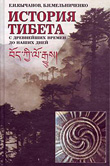 "Eastern Literature." 2005., 351 pp. (In Russian)
"Eastern Literature." 2005., 351 pp. (In Russian)
The book contains a systematic file of the history of Tibet from the arrival people to the Tibetan Highlands before the beginning of the XXI century. Its basis was the course, which the authors read at the St. Petersburg State University.
It tells about the formation of the Tibetan ethnos, the period of greatness of the Tibetan Empire in the 7th-9th centuries, the transition of Tibetan Buddhism to the Mongolian world and addition in the 17th century Tibetan theocratic State under the Dalai Lama leadership, the internal state and foreign policy ties of Tibet in the XIX - first half of the XX century, the creation and current situation of the Tibet Autonomous Region of China.
Dr. Nikolai S. Kuleshov
«Russia’s Tibet File»
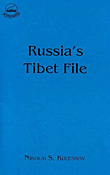 Published by LTWA, Dharamsala, 1996, pages 144.
Published by LTWA, Dharamsala, 1996, pages 144.
Russia's Tibet file: the unknown pages in the history of Tibet's independence offers the reader a challenging new interpretation of Tibetan political history in the early years of the 20th century. Using evidence gleaned largely from Russian, Indian and British archival sources, author Dr. Nikolai S. Kuleshov puts forward a persuasive thesis and sheds new light on the relations between these political powers and Tibet.
Basing his study around the central figures of the tune-His Holiness the 13th Dalai Lama, the Buryat lama Agvan Dorjiev, Lord Curzon as Viceroy of India and Sir Francis Younghusband-the author documents the events and changing circumstances of Tibet's political fortunes, and offers the reader a fascinating and innovative look behind the scenes of governmental policy and ambition.
Alexandre Andreyev
«Soviet Russia and Tibet, The Debacle of Secret Diplomacy, 1918-1930s»
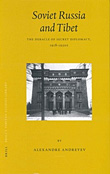 Publisher: Brill's Tibetan Studies Library, 2003, 434 pages
Publisher: Brill's Tibetan Studies Library, 2003, 434 pages
This is the first investigation into the little-known Bolshevik foreign ministry's strenuous efforts to win Lhasa over to the Soviet cause in the 1920s. Examining the history of relations between Russia (tsarist, Soviet and post-Soviet) and Tibet from the 17th century to the 1990s, the author puts at the core of his narrative the previously unknown story of clandestine negotiations between the Soviet government and the 13th Dalai Lama, forming part of Moscow's bitter struggle against British imperialism in Asia.
The book provides insight into Soviet secret diplomacy and draws important conclusions relating to the history of Anglo-Russian competition for Tibet and Tibet's status prior to 1951.
Tatiana L. Shaumian
«Russia, Great Britain and Tibet in the «Great Game»
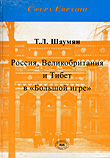 Moscow: KMK Scientific Press, 2017. (Russian)
Moscow: KMK Scientific Press, 2017. (Russian)
«Tibet: The Great Game and Tsarist Russia»
Published by Oxford University Press, 2000, pages 223. (English)
The book deals with the little-known history of international relations in Central Asia and the Far East in the late 19th - early 20th Century. It makes use of many original sources from the Foreign Policy Archives of the Russian Empire and the National Archives of India, including correspondence between the Russian Czar and the 13th Dalai-Lama, reports and letters from Russian diplomatic representatives and agents from London, Calcutta, Bejing and Urga.
The author shows the meaning of Tibet in the Russian foreign policy, describes features of Tibet’s relationship with Russia, the Qing Empire, Great Britain and Mongolia, and details of attempts to consolidate Tibet’s independence.
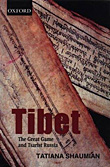 The establishment of Russian-Tibetan relations, the Tibetan missions to Russia in 1900 and 1901 were connected with key trends of Russian Far Eastern and Central Asian policies as a part of the “Great Game”, an Anglo-Russian rivalry in Asia. Tibetan missions to Russia gave Lord Curzon a pretext to send a British military expedition to Tibet in 1903-1904.
The establishment of Russian-Tibetan relations, the Tibetan missions to Russia in 1900 and 1901 were connected with key trends of Russian Far Eastern and Central Asian policies as a part of the “Great Game”, an Anglo-Russian rivalry in Asia. Tibetan missions to Russia gave Lord Curzon a pretext to send a British military expedition to Tibet in 1903-1904.
The author argues that it was the Tibetan question that became the ballon d’essai in Anglo-Russian negotiations and created an opportunity for both sides to recognize other’s intentions. The Anglo-Russian Convention of 1907 created an opportunity for the Qing Empire to strengthen its position in Tibet.
Kenneth Conboy, James Morrison
«The CIA's Secret War in Tibet»
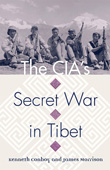 The CIA's Secret War in Tibet» Decom Publishing House, 2017.
ISBN: 978-5-89533-373-0
The CIA's Secret War in Tibet» Decom Publishing House, 2017.
ISBN: 978-5-89533-373-0
The book “The CIA's Secret War in Tibet” written by American authors deals with the events of the 1950-1970s. It unveils “the mysterious country of Shangri-La” which is still considered by many people as Tibet, reveals a little-known page in the history of Tibet and communist China, and gives an opportunity to look at these events through the eyes of a witness.
In the book there is a detailed description of the Tibetan militants training, sabotage actions, military operations and espionage, CIA assistance in rehabilitation of some Tibetan commandos after the operation, and transfer of a significant number of these fighters to the service of India.
The book tells of saboteurs’ participation in the Dalai Lama’s escape from Tibet and of the extent to which the supreme and secular ruler of the Land of Snows and his closest relatives and surrounding were involved in the militants’ actions. The book unveils direct or indirect participation of the other states except China and the United States in this secret war: that of India, Nepal, Pakistan, Thailand and Taiwan.
Besides, the book deals with the repeated contacts of Tibetan militants with the USSR Main Intelligence Directorate and the work they carried out for the Soviet intelligence; the militants’ role in the War for Independence of Bangladesh; and finally, their participation in the most “high-mountain” war in history: the Indian-Pakistani conflict on the Siachen glacier.
The authors of the book are Americans who had worked with declassified archives for 5 years and interviewed dozens of direct participants of those events:
Kenneth Conboy is a political analyst, historian, and Deputy Head of the Center for Asian Studies (Washington). He is an author of several books on modern wars.
James Morrison is US Army veteran who served in the Special Forces for more than 30 years. He, co-authored with K. Conboy, wrote a number of books including “Shadow War: The CIA's Secret War in Laos”.
![]()
![]()
![]()
![]()
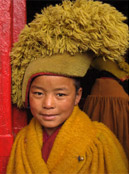



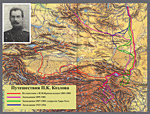
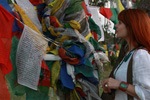



 "Eastern Literature." 2005., 351 pp. (In Russian)
"Eastern Literature." 2005., 351 pp. (In Russian) Published by LTWA, Dharamsala, 1996, pages 144.
Published by LTWA, Dharamsala, 1996, pages 144. Publisher: Brill's Tibetan Studies Library, 2003, 434 pages
Publisher: Brill's Tibetan Studies Library, 2003, 434 pages  Moscow: KMK Scientific Press, 2017. (Russian)
Moscow: KMK Scientific Press, 2017. (Russian) The establishment of Russian-Tibetan relations, the Tibetan missions to Russia in 1900 and 1901 were connected with key trends of Russian Far Eastern and Central Asian policies as a part of the “Great Game”, an Anglo-Russian rivalry in Asia. Tibetan missions to Russia gave Lord Curzon a pretext to send a British military expedition to Tibet in 1903-1904.
The establishment of Russian-Tibetan relations, the Tibetan missions to Russia in 1900 and 1901 were connected with key trends of Russian Far Eastern and Central Asian policies as a part of the “Great Game”, an Anglo-Russian rivalry in Asia. Tibetan missions to Russia gave Lord Curzon a pretext to send a British military expedition to Tibet in 1903-1904. The CIA's Secret War in Tibet» Decom Publishing House, 2017.
ISBN: 978-5-89533-373-0
The CIA's Secret War in Tibet» Decom Publishing House, 2017.
ISBN: 978-5-89533-373-0